
ISACA Podcast
ISACA Podcast
Insight on the latest security, audit and governance trends
- 26 minutes 7 secondsCybersecurity Predictions for 2025
The prevalence of ransomware and the security concerns associated with AI have made the role of cybersecurity professionals vital for enterprise success. The complex security landscape can make cybersecurity jobs stressful, but enterprises can take steps to retain cybersecurity talent and ensure enterprise assets are protected. In this podcast, Justin Rende, founder and CEO at Rhymetec, shares insight on the top concerns for cybersecurity professionals, the most in-demand skills, and the impact of AI on cybersecurity.
7 January 2025, 4:11 pm - 38 minutes 28 secondsExamining Authentication in the Deepfake Era with Dr. Chase Cunningham
Given the dynamic nature of cyberthreats and the ever-expanding digital ecosystem, authentication is more critical than ever. In this episode, ISACA director of professional practices and innovation discusses a new content piece titled, "Examining Authentication in the Deepfake Era" with author Dr. Chase Cunningham. Their conversation of the paper explores the evolution, current state, and future trajectory of authentication technologies.
10 December 2024, 6:00 am - 25 minutes 10 secondsSafely and Responsibly Using Emerging Health Technology
Emerging healthcare technologies have the potential to revolutionize healthcare and accessibility-related concerns, but these advancements are not without risk. To maximize the value and minimize the harms associated with emerging health technologies, it is critical to address ethical, privacy, and societal concerns to ensure that these technologies help rather than hurt humanity.
In this ISACA Podcast, join Safia Kazi and Collin Bedder as they explore the applications and risks associated with emerging healthcare technologies.
5 December 2024, 6:00 am - 25 minutes 49 secondsAddressing SAP Security Gaps
SAP systems are treated differently than many other enterprise applications from a cybersecurity perspective. Most SAP security teams are siloed and left to meet security objectives on their own. Since SAP is so integral to organizations, it is unusual for SAP security objectives to not be on the radar of an existing 24/7 cybersecurity team executing response actions for Linux or Microsoft environments. SAP teams must be integrated w
SAP systems are treated differently than many other enterprise applications from a cybersecurity perspective. Most SAP security teams are siloed and left to meet security objectives on their own. Since SAP is so integral to organizations, it is unusual for SAP security objectives to not be on the radar of an existing 24/7 cybersecurity team executing response actions for Linux or Microsoft environments. SAP teams must be integrated with other cybersecurity groups within an organization to empower them with a security approach that unifies the entire enterprise landscape.
A chief information security officer (CISO) has many priorities, but when it comes to SAP environments, CISOs must fully understand how SAP applies to the IT enterprise and organizational environment to help them achieve all security goals. In addition, CISOs need to know their SAP team members personally so they can integrate them rather than contain them in silos. Finally, SAP must be secured to the same degree as other enterprise applications. When there is a Linux, Microsoft, or even a hybrid cloud incident, cybersecurity teams have a detailed plan of action upon which they are ready to act. SAP requires high-level consideration, or critical elements of the business will be vulnerable to malicious cyber actors—with no apparent response.
17 September 2024, 6:00 am - 21 minutes 44 secondsWhat Enterprises Need to Know About ChatGPT and Cybersecurity
Many people are pondering whether generative artificial intelligence (AI) tool ChatGPT is a friend or a foe.
In this ISACA podcast episode, Camelot Secure Director of Solutions Engineering Zachary Folks discusses not only his view of how ChatGPT can be considered an evolution of the encyclopedia, but importantly how it is aiding cybersecurity professionals and the overall goal of enterprise security, as well as how cybercriminals who want to exploit it can leverage it as well. He believes the world is entering a time when AI is fighting AI, and security professionals must focus on feeding ChatGPT technology more relevant data faster than the adversary. Folk also addresses how AI is affecting social engineering and his predictions for upcoming AI developments.
24 July 2024, 9:00 am - 48 minutes 45 secondsThe Cyber Standard Podcast - Episode 4
Welcome to Episode 4 of "The Cyber Standard Podcast"!
Join host Ameet Jugnauth, Vice President of the London Chapter of ISACA, as he delves into the world of cybersecurity standardization. In this episode, titled "Becoming a License Body," Ameet is joined by esteemed guests Bryan Lillie, Strategic Technical Lead at the UK Cyber Security Council, and Peter Leitch, Co-Founder and Managing Partner at ANSEC. Together, they explore the intricacies of licensed bodies in shaping the cyber profession. Don't miss this insightful conversation!
Explore Further:
Delve deeper into the subject with additional resources provided in the episode description.
30 May 2024, 6:00 am - 55 minutes 25 secondsThe Cyber Standard Podcast - Episode 3
Welcome to Episode 3 of "The Cyber Standard Podcast"!
Join host Ameet Jugnauth, Vice President of the London Chapter of ISACA, as he delves into the essential aspects of applying for and assessing candidates in the cybersecurity field. In this episode, titled "How to Apply," Ameet is joined by distinguished guests Ethan Duffell, representing the UK Cyber Security Council, and Allan Broadman, Director of CyberAdvisor London. Together, they shed light on the launch of specializations and the significance of professional standards in the cybersecurity sector. Don't miss this insightful conversation!
Explore Further:
Delve deeper into the subject with additional resources provided in the episode description.
25 April 2024, 6:00 am - 31 minutes 23 secondsEffective Third Party Risk Management in 2024: AI’s Impact and Future Trends
Traditional security questionnaires just aren't cutting it anymore.
Tune into this ISACA Podcast episode, Chris McGowan chats with VISO TRUST CEO and Co-founder, Paul Valente as they delve into the evolving landscape of Third-Party Risk Management (TPRM), exposing the limitations of current methods and exploring how emerging AI trends are shaping a more secure future and driving more effective third-party risk management programs.
To learn more about VISO Trust please go to https://visotrust.com/
24 April 2024, 9:00 am - 27 minutes 14 secondsUnlocking Strategic Value from a Bug Bounty Program
Are you curious about how to maximize the strategic value and impact of your bug bounty program?
In this episode, you can learn how Adobe continuously develops and improves its bounty program to engage security researchers and hackers globally and improve its security posture from an adversary perspective.
In this ISACA Podcast, Chris McGown, ISACA's Information Security Professional Practices Principal, chats with Alex Stan, Product Security Engineer and member of the Product Security Incident Response Team (PSIRT), discusses the value of bug bounty programs and shares how you can develop a metrics-driven approach to enhance the internal security testing and detection capabilities of your organization.
Explore Further: Delve deeper into the subject with additional resources
https://blog.developer.adobe.com/adobe-recap-2023-ambassador-world-cup-final-four-df701e1a1b12
3 April 2024, 6:00 am - 42 minutes 35 secondsThe Cyber Standard Podcast - Episode 2
Welcome to Episode 2 of "The Cyber Standard Podcast"!
Join host Ameet Jugnauth, Vice President of the London Chapter of ISACA, as he delves into the intricacies of cybersecurity standardization. In this episode, titled "Audit and Assurance," Ameet is joined by esteemed guests Leanne Sperry, Project Manager for Standards Development at the UK Cyber Security Council, and Mike Hughes, the ISACA Immediate Past President for ISACA Central UK. Together, they explore key challenges, lessons learned, and insights from related workshops in the realm of Audit and Assurance. Don't miss this insightful conversation!
Explore Further:
Delve deeper into the subject with additional resources provided in the episode description.
28 March 2024, 6:00 am - 41 minutes 39 secondsThe Cyber Standard Podcast - Episode 1
Tune in to the inaugural episode of "The Cyber Standard Podcast," “The Vision!”
Join host Ameet Jugnauth as he interviews Robin Lyons, ISACA Principal, IT Audit Professional Practices, and Annmarie Dann, Director of Professional Standards at the UK Cyber Security Council, in a compelling discussion about the standardization of specialisms in cybersecurity. Explore the Council's and ISACA's visions for the future, the significance of the Audit & Assurance specialism, and the collaborative efforts between the two organizations. Don't miss this insightful conversation that sets the stage for the podcast's journey into the world of cybersecurity standardization.
Explore Further: Delve deeper into the subject with additional resources provided in the episode description.
28 February 2024, 2:00 am - More Episodes? Get the App
Your feedback is valuable to us. Should you encounter any bugs, glitches, lack of functionality or other problems, please email us on [email protected] or join Moon.FM Telegram Group where you can talk directly to the dev team who are happy to answer any queries.
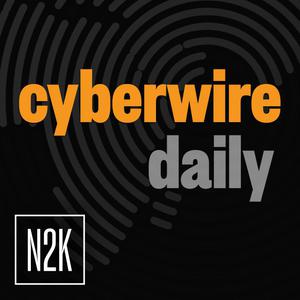 CyberWire Daily
CyberWire Daily
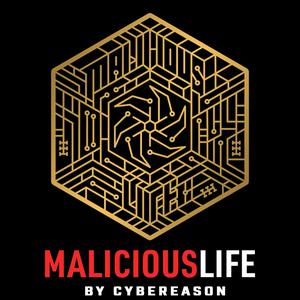 Malicious Life
Malicious Life
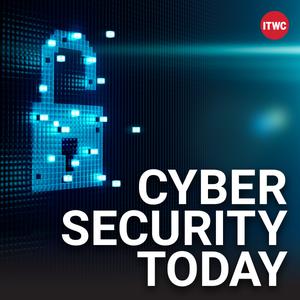 Cybersecurity Today
Cybersecurity Today
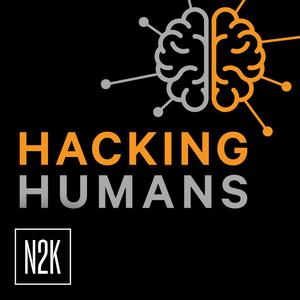 Hacking Humans
Hacking Humans
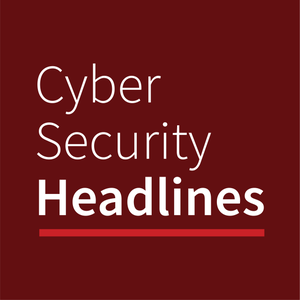 Cyber Security Headlines
Cyber Security Headlines
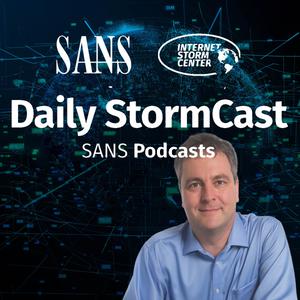 SANS Internet Stormcenter Daily Cyber Security Podcast (Stormcast)
SANS Internet Stormcenter Daily Cyber Security Podcast (Stormcast)